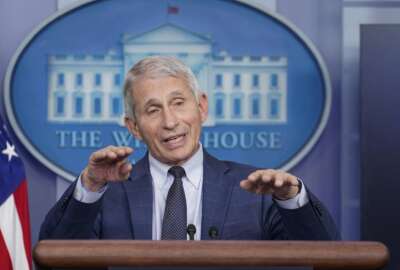Dr. Anthony Fauci catches the retirement virus
In today's Federal Newscast: Some federal agencies just found out they overlooked nearly a half billion dollars in uncollected debts. Dr. Anthony Fauci admits he's...
To listen to the Federal Newscast on your phone or mobile device, subscribe in PodcastOne or Apple Podcasts. The best listening experience on desktop can be found using Chrome, Firefox or Safari.
- Federal Agencies overlooked nearly a half billion dollars in uncollected debts. A whistleblower tipped off the Office of Special Counsel to a software flaw back in 2019. OSC referred the matter to the Treasury Inspector General. The IG just released its findings and it’s true: 28 agencies across the government failed to collect fines and other debts, $135 million owed to the Defense Department. Treasury’s Bureau of the Fiscal Service has corrected the flaw, but many of the debts are too old to collect.
- One federal union continued its push for a larger pay bump for feds. The National Treasury Employees Union is advocating for a larger pay raise in 2023 than the White House’s 4.6% proposal. NTEU National President Tony Reardon told Federal News Network the union is urging a higher pay raise of at least 5.1% the FAIR Act. Reardon said, “4.6 is better than any pay raise in the last 20 years. But, since that number was first put into motion, look what’s happened to inflation. And so in order to make sure that we’re paid fairly, supporting the 5.1% is the right way to go.”
- Some 1,400 Air Force employees at Joint Base Andrews and Joint Base Anacostia received a new union-negotiated contract from the American Federation of Government Employees, which restores several parts of a previous collective bargaining agreement. In the new contract, workers at those bases are allowed to refuse unsafe work and report unsafe conditions. The agreement also provides workplace protections against discipline and performance issues for employees who work for the Acquisition Demonstration Project.
- For the first time since 1984, the National Institute of Allergy and Infectious Diseases will have a change in leadership on the horizon. Dr. Anthony Fauci announced Monday that he plans to retire by the end of President Joe Biden’s term in January 2025. The 81-year-old Fauci has led the agency’s research in HIV/AIDS, respiratory infections, Ebola, Zika and the coronavirus. (Federal News Network)
- DoD’s Space Development Agency has picked Northrop Grumman and L3Harris to start building a new constellation of satellites to track missile threats. Each company will build 14 satellites for the new National Defense Space Architecture’s “tracking layer.” The combined awards are worth up to $1.3 billion. Unlike current missile tracking satellites, the new constellation is meant to be continually replaced with cheaper, more abundant satellites every two-to-five years.
- The Cybersecurity and Infrastructure Security Agency heard London calling. CISA’s very first international attaché office will open in the UK capital this month. The agency said the London location will be a focal point for international collaboration between CISA, the U.K. government and other federal agency officials. CISA also announced Julie Johnson as its first U.K. attaché. Johnson previously served as a Regional Protective Security Adviser for CISA in New York.
- U.S. spy agencies are looking at ways to combine the traditionally rigid world of intelligence with modern workplace benefits. Director of National Intelligence Avril Haines touted telework and other workplace flexibilities during a speech last week. She said the intelligence community is committed to addressing work-life balance challenges, particularly for parents and caretakers. And she said intel agencies are looking at increasing loan repayment programs, as well as shadowing and mentorship opportunities. “These are the types of small adjustments that are necessary that can go a long way to meet the preferences of a 21st century workforce while still meeting our mission requirements,” Haines said. (Federal News Network)
- The Air Force made a huge new award to deliver IT services to airmen in Europe and Africa. General Dynamics Information Technology could get up to $908 million over the next decade under the new Europe-Wide Information Technology and Enterprise Network (EITEN) contract. The Air Force said it will cover a wide range of services, including IT support, network services, command and control, and cybersecurity.
- Veterans in crisis now have an easier way to call and get help. They can dial 988 and then press 1 to get connected to the Veterans Crisis Line. The Department of Veterans Affairs operates the Veterans Crisis Line through the 988 Lifeline’s national network. On the other end of that line are more than 500 suicide prevention coordinators across the VA health care system.
- A bill to increase the transparency of political appointees in government cleared a major hurdle. The House included the Periodically Listing Updates to Management or PLUM Act as an amendment to the fiscal 2023 National Defense Authorization Act that passed last week. The bill would require the Office of Personnel Management to maintain a public directory of data on the president’s appointees and other senior positions. Agencies would have to submit data to OPM every month. House Oversight and Reform Committee Chairwoman Carolyn Maloney (D-N.Y.) and committee members John Sarbanes (D-Md.) and Gerry Connolly (D-Va.) introduced the legislation.
- The General Services Administration is warning the Federal Acquisition Service that its plan to expand the Transactional Data Reporting Rule could force agencies to overpay for products. The new plan would expand TDR to the entire Multiple Award Schedules Program, which is already facing data quality and access issues. According to the alert, the TDR pilot has been in effect within the MAS Program for more than five years and has yet to accomplish its purposes because of inaccurate and unreliable data for pricing decisions.
Copyright © 2025 Federal News Network. All rights reserved. This website is not intended for users located within the European Economic Area.
Peter Musurlian
Peter Musurlian is a producer at Federal News Network.
Follow @PMusurlianWFED




